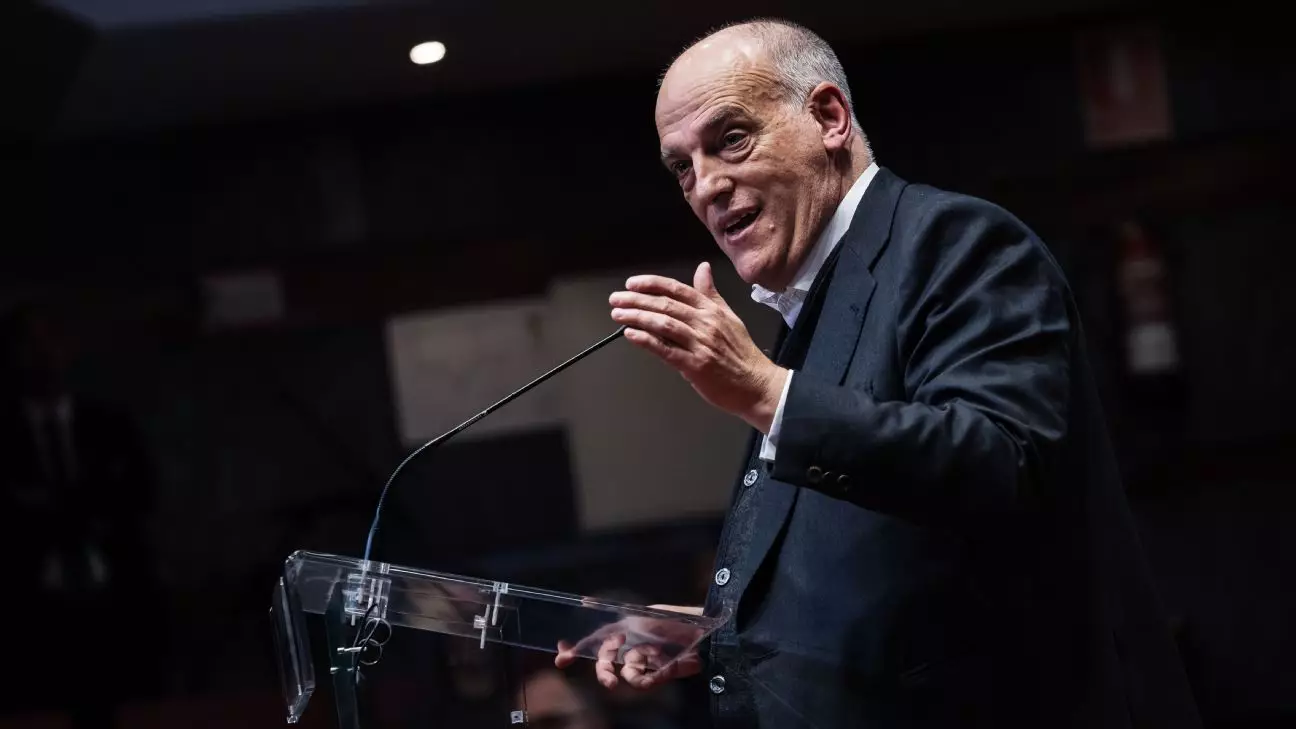In the realm of professional football, financial regulations and player registrations are paramount. Yet, recent events surrounding Dani Olmo, a Barcelona forward, have sparked a contentious debate that underscores deeper issues within LaLiga’s governance. As the president of LaLiga, Javier Tebas, continues to advocate for Olmo’s unregistration, the situation raises questions about compliance, fairness, and the integrity of the league.
Dani Olmo’s journey to Barcelona from RB Leipzig for a substantial fee of €60 million ($62.4m) added considerable weight to a roster that had lofty ambitions. However, the excitement surrounding his arrival quickly became mired in controversy when LaLiga and the Royal Spanish Football Federation (RFEF) unregistered him on January 1 due to FC Barcelona’s failure to adhere to the established financial fair play (FFP) regulations by the December 31 deadline. This incident is significant as it not only affects Olmo but also sheds light on Barcelona’s ongoing struggle to balance ambitions while adhering to strict financial guidelines.
This unregistration initially seemed like a procedural infraction, but the subsequent intervention by Spain’s sports ministry (CSD) to reinstate Olmo raised eyebrows. The CSD’s decision was based on an acknowledgment that Barcelona’s appeal warranted further examination. For many clubs within LaLiga, this perceived leniency towards Barcelona sparked discontent and accusations of favoritism.
The responses from other clubs, including Atlético Madrid, Espanyol, and Valencia, hint at a broader unease with how the league enforces its regulations. Javier Tebas echoed these sentiments, asserting that the reaction from fellow clubs was justified. “If we, as LaLiga, are taking the action we are taking, it’s because we feel that the decision that has been made is not in accordance with the regulations,” Tebas stated, underscoring the dissatisfaction brewing within the league.
This conflict illustrates a fragmented atmosphere in LaLiga, where clubs are increasingly wary of perceived disparities in the treatment of financial regulations. Complaints erupted from various teams that felt overshadowed by Barcelona’s privileged status. The pressure to maintain fairness and integrity has never been more critical, especially in an era where financial mismanagement can dramatically affect a club’s future.
Despite the controversy, Olmo has made appearances after the CSD’s ruling, participating in key matches including a Supercopa win over Real Madrid. However, his recent absence from the team due to injury raises questions not just about his fitness but his overall standing amidst the backdrop of an ongoing registration saga. Meanwhile, Pau Víctor, another player involved in this controversy, remains on the fringes with limited game time.
Tebas clarified that teams are unable to contest match results in which Olmo participated, stressing that once a player is registered—regardless of the later legality of that registration—those games cannot be challenged. This clause signifies a loophole that could lead to further complications down the line, as clubs may feel compelled to protect their interests while adhering to the rules set forth by LaLiga.
Barcelona’s troubles are compounded by systemic issues within the world of football finance. The club’s initial ability to temporarily register Olmo and Víctor hinged on utilizing another player’s salary allocation, which exhibits a loophole in the regulations aimed at helping clubs manage FFP constraints. However, this workaround can only stretch so far before bringing the issue of sustainability to the forefront.
As of January 3, LaLiga confirmed that Barcelona had satisfied certain FFP requirements, leading to an extended spending cap. However, a crucial stipulation remains: players whose registrations have been canceled cannot be re-registered for the same season, which puts an expiration date on the club’s ability to utilize their talents moving forward.
In the quest for fairness, LaLiga finds itself at a crossroads. With potential rulings from the CSD looming, clubs and fans alike are left in suspense regarding the implications of this complex saga. The Dani Olmo registration dilemma not only highlights the precarious balance of competitive integrity in football but also serves as a reminder for clubs to navigate the intricate landscape of financial regulations more prudently. As the situation unfolds, the decisions made now may echo throughout the league for seasons to come, defining both the future of compliance and the philosophy that governs LaLiga as a whole.

